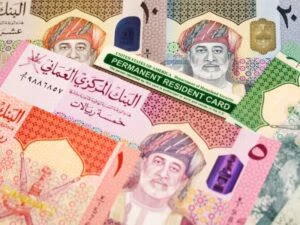In a rapidly changing financial landscape, many still re-think credit card usage, despite its potential as a powerful tool. Especially, with younger generations using credit cards for their convenience and rewards in full swing, experts are focusing on the importance of using them responsibly.
When Thriwe rolled into the UAE market, it envisioned itself at the forefront of a transformative loyalty landscape, embracing the exciting developments that will define the next decade.
It’s a digital-first landscape where everything touches upon personalization and experience-driven strategies. “Driven by younger consumers seeking convenience and meaningful engagement, Thriwe differentiates itself by offering lifestyle-driven rewards tailored to GCC millennials and Gen Z,” said Thriwe Founder & CEO, Dhruv Verma.

So, what are the most common misconceptions people have about credit cards, and how can they avoid falling into the debt trap, is a question that many ask.
According to Verma, “Credit cards can be a powerful financial tool when used responsibly and there are several myths and misconceptions surrounding them.”
“In reality, when used thoughtfully, credit cards can offer valuable rewards, discounts, and perks,” he noted.
However, paying only the minimum due amount can lead to high interest charges and negatively impact credit scores. Many individuals mistakenly believe that carrying a balance forward helps improve their credit score, but Verma advises paying off balances in full each month to maintain a healthy credit profile.
“People need to be aware of to optimize their benefits and avoid the common pitfalls,” he said.
Why so many misconceptions about credit card usage?
Many individuals mistakenly believe that carrying a balance forward on their credit cards helps improve their credit score. However, it’s actually better to pay off balances in full each month to maintain a healthy credit profile. Additionally, missing a payment is often downplayed, but it can lead to late fees, higher interest rates, and significant damage to one’s creditworthiness.
“For instance, some believe that credit cards should be avoided entirely, but in reality, when used thoughtfully, they can offer valuable rewards, discounts, and perks. Another common misunderstanding is that paying only the minimum due amount is enough. However, this practice can lead to accumulating high-interest charges and a negative impact on your credit score,” Dhruv noted.

What do responsible credit card practices mean?
Verma emphasized the importance of responsible credit card practices, particularly in avoiding falling into debt.
He explained, “Always aim to pay the full balance by the due date to avoid interest and protect your credit score. Set up reminders or automate payments to ensure you never miss a deadline.”
Maintaining spending within the recommended limit and using one or two credit cards responsibly rather than opening multiple accounts are also key to effective credit card management.
Are you actually overspending to get the cashback offers?
One of the popular features of credit cards in the UAE is the cashback reward programs, which return a percentage of spending as a reward.
“To maximize cashback rewards while staying financially savvy, consumers should prefer using credit cards that offer cashback on regular purchases,” Verma suggested.
However, he cautioned against chasing rewards at the expense of financial prudence: “While trying to earn rewards, it’s important to purchase based on needs, not just to earn rewards. Overspending can lead to high-interest charges, which can offset the benefits of cashback rewards.”
Stop chasing rewards
A reward makes everyone happy. Being in the UAE market, it’s unlikely that people want to miss out on any amount (AED) that comes as a reward. But Dhruv asks to not get trapped in the pitfall of chasing rewards.
“While trying to earn the maximum amount of reward points, it is imperative for customers to keep in mind that one should purchase solely based on their needs, instead of overspending just to earn rewards. It is important to pay your balance in full to avoid high-interest charges that can offset any benefits that cashbacks offer. Customers should also keep track of their cashback limits and expiration dates to ensure that they make the most of their earned rewards,” he explained.
How can you maximize your credit card usage?
For those looking to maximize their credit card usage, Verma suggested several strategies, such as paying recurring bills like utilities and subscriptions using credit cards to earn rewards.
Additionally, credit cards offer added protection like travel insurance for bookings and fraud protection for online purchases. For larger purchases, no-cost EMIs and extended warranties can be beneficial. Verma also noted that dining and entertainment expenses are great opportunities for earning bonus rewards.
“Through no-cost EMIs and extended warranties, they can be ideal for larger, planned purchases. Spending on dining and entertainment is a great opportunity to earn bonus rewards on lifestyle spending. Finally, credit cards can be an invaluable resource in case of medical emergencies, by offering immediate access to funds,” he added.
Where you must avoid?
It is prudent to avoid credit usage for certain types of payments. Cash withdrawals are not advisable, as there are usually high fees and interest rates associated with them.
Large, unplanned transactions should be avoided, especially for impulse purchases. Using credit cards for investments or paying off loans is never wise, due to high interest rates and extra fees or restrictions.
“You should also avoid payments to unverified online merchants to avoid the risk of fraud. Moreover, due to their very nature, gambling and betting with credit cards can be risky as it might push customers toward a debt spiral,” he elaborated.

Credit cards can sometimes lead to debt or financial stress, but the right education and knowledge keep things moving smoothly.
“Firstly, it is important to manage your expenses thoughtfully. In a way, you should treat your credit card like a debit card, i.e. spend only what you can afford to pay off in full each month to avoid high interest rates,” he said.
“Secondly, it is also important to remember to pay your balance in full and on time. Paying only the minimum charges can result in long-lasting debts and interest accumulation. Customers can consider using automatic payments or setting up reminders to ensure that they pay off their due balance in each billing cycle,” Verma concluded.






